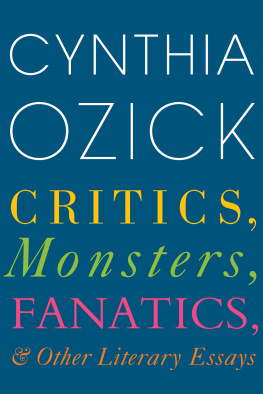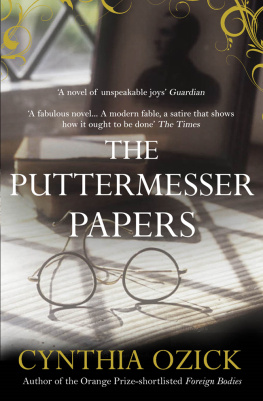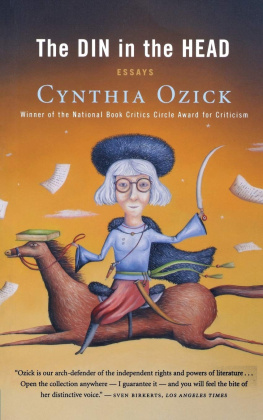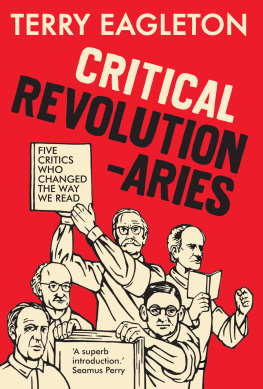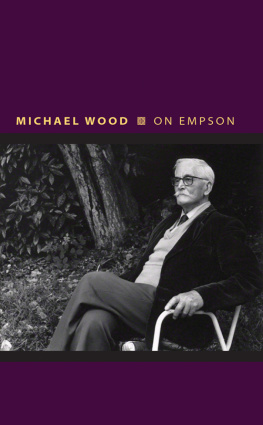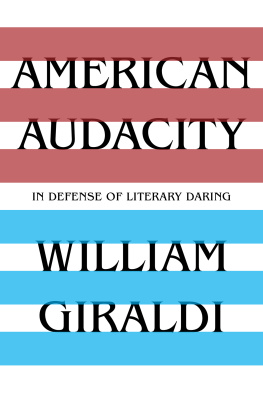Copyright 2016 by Cynthia Ozick
All rights reserved
For information about permission to reproduce selections from this book, write to or to Permissions, Houghton Mifflin Harcourt Publishing Company, 3 Park Avenue, 19th Floor, New York, New York 10016.
www.hmhco.com
Library of Congress Cataloging-in-Publication Data
Names: Ozick, Cynthia, author.
Title: Critics, monsters, fanatics, and other literary essays / Cynthia Ozick.
Description: Boston : Houghton Mifflin Harcourt, 2016.
Identifiers: LCCN 2015037560 | ISBN 9780544703711 (hardback) | ISBN 9780544703698 (ebook)
Subjects: LCSH : Criticism. | BISAC: LITERARY CRITICISM / Books & Reading. | LITERARY CRITICISM / American / General.
Classification: LCC PN 81.095 2016 | DDC 801/.95dc 23
LC record available at http://lccn.loc.gov/2015037560
Essays in this book originally appeared, in different form, in the following: Out from Xanadu, I Write Because I Hate, Please, Stories Are Stories, An Empty Coffin, and The Rhapsodist, in the New York Times Book Review; Writers, Visible and Invisible in PEN Magazine and Standpoint (UK); The Boys in the Alley, the Disappearing Readers, and the Novels Ghostly Twin in Harpers Magazine; W. H. Auden at the 92nd Street Y in the Paris Review Online; and The Lastingness of Saul Bellow, Nobility Eclipsed, Transcending the Kafkaesque, Love and Levity at Auschwitz, and Novel or Nothing in the New Republic.
Permissions credits appear on .
Cover design by ArchieFergusonDesign.com
v1.0616
For
L. W.,
inspiriter
Authors are partial to their Wit, tis true.
But are not Criticks to their Judgment too?
... Those monsters, Criticks!
ALEXANDER POPE ,
An Essay on Criticism, 1711
Critics
George Orwell and Edmund Wilson are emblematic names that have come down to us from the still ticking heart of the twentieth centuryliterary names that carry meaning. Speak of Orwell, and what reverberates is monitory: Animal Farm and 1984, each a forceful parable of totalitarian oppression. But Orwell was also renowned as a sonorous essayist, one who is nowadays not much read beyond the campus, where Shooting an Elephant is a mainstay of the college anthologies. Except for Animal Farm, his fiction fails to attract ongoing noticeleast of all Keep the Aspidistra Flying, long ago interred among the forgotten social novels of the 1930s. And apart from Orwell specialists, who now reads The Road to Wigan Pier? Yet Big Brother and Newspeak and memory hole are so ingrained in the common idiom that for many it hardly seems necessary to trouble to turn the already familiar pages of 1984. None of this matters; what counts is the echo of Orwells name and the bleakness it evokes: dread; deception; injustice; anomie; soullessness. Orwell has become Orwellian.
Edmund Wilson germinates no parallel verbal progeny: Wilsonian, if it suggests anything, characterizes the policies of an American president. We have no single termno summarizing atmospheric wordfor Americas preeminent critic, who has no peer and may never be surpassed. He encompassed worlds: he wrote on the Iroquois, on an ancient Hebrew religious sect, on Russian philology, on the French Symbolists, on the evolution of radical political movements from Robespierre to the Bolsheviks, on the Civil War; he wrote on Canada and on Haiti, on citizenship and taxation, on movies and theater, on poets and novelists, on historical figures and on his contemporaries. He also wrotecriticallyon literary criticism.
In 1928, in an acerbic and dismissive essay titled The Critic Who Does Not Exist, he complained of the lack of serious literary criticism in the United States. A work of art, he said, is not a set of ideas or an exercise of technique, or even a combination of both. But I am strongly disposed to believe that our contemporary writing would benefit by a genuine literary criticism that should deal expertly with ideas and art.... In a sense, it can probably be said that no such creature exists as a full-time literary criticthat is, a writer who is at once first-rate and nothing but a literary critic. Wilson, of course, was that creature, and today there are a number of first-rate writers of criticism who are at work full-time; but are there enough to make what can be called an expansive literary culture?
If we isolate only one decade of the many Wilson dominatedthe 1920s, saythe extent and variety of his perceptions and preoccupations astonish. It is as if Wilson were not one critic but scores of critics, all working separately in their respective specialties. His All-Star Literary Vaudeville is an essay that ranges over dozens of writers, most of them durably familiar to their posterityDreiser, Mencken, Willa Cather, Sherwood Andersonthough some, like Carl Van Vechten and Joseph Hergesheimer, today seem no more visible than distant ghosts. Between 1924 and 1928 alone, Wilson rounded up his reflections on Houdini, Poe, dialect and slang, e. e. cummings, Woodrow Wilsons years at Princeton, Ring Lardner, Eugene ONeill, Hemingway, F. Scott Fitzgerald, Byrons mistresses, subjects such as the humility of common sense and the trouble with American comedy, John Dos Passos, T. S. Eliot, Ezra Pound, Henry James, Upton Sinclair, a Prohibition-era speakeasy; and much more, all in seamlessly lucid prose.
It should be understoodit should be trumpetedthat not one of these essays is dated. Not one is infected by staleness. Wilsons achievement rises beyond reviewing, giving the news, assessing his time. Read him now and see the lineaments of a civilization; he reproduces nothing less. The critic has become a historian.
And here is the shock of it. Wilson stands as a kind of symbolfar more than a literary model to aspire to. He is what current lingo, falling into the tedium of overuse, terms an icon, the embodiment of an indissoluble fame. And like Orwell, whose reputewhose meaningis similarly enduring, he is not read. Admired, honored, influential, legendary; rumored, but not read. Which brings us, alarmingly, to the Orwellian: the dying of the imagination through the invisibility of the past. As for the uses of criticism by the denizens of the present moment: envisioning society whole by way of the contemplation of its parts, the delicate along with the tumultuous, the weighty together with the trifling, is how a culture can learn to imagine its own face.
Without the critics, incoherence.
The Boys in the Alley, the Disappearing Readers, and the Novels Ghostly Twin
On or about December 1910, Virginia Woolf wrote more than one hundred years ago, human character changed. The phrase has come down to us mockingly, notoriously, but also with the truth-like endurance of a maxim. By a change in human character, Woolf meant modernism, and by modernism she meant the kind of overt self-consciousness that identifies and interrogates its own motions and motives. Set forth in Character in Fiction, an essay arguing for innovation in the novel, it was an aesthetic rather than an essentialist proposition. The changea new dispensation of premise and utterancehad been wickedly heralded two years before, on an August afternoon in 1908, when Lytton Strachey happened to notice a stain on Woolfs sisters skirt. Semen? Strachey inquired, as definitively as the final squeal of a hinge: a door flung shut for the last time. Behind that door lurked the muzzled premodern, and before it swarmed what modernism has long since made of us (and postmodernism even more so): harriers of the hour, soothsayers and pulse-takers, augurs and dowsers, examiners of entrails. Literary entrails especially: many are the stains subject to writerly divination.
Next page
